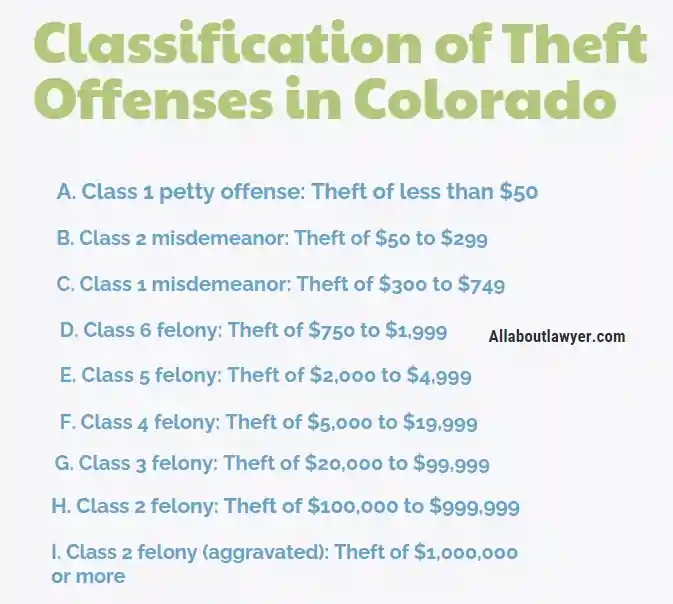Theft Laws in Colorado Guide For Charges, Penalties, and Legal Defenses
Theft crimes in Colorado encompass a wide range of offenses, from minor shoplifting incidents to major financial fraud cases. These crimes are taken seriously by Colorado’s criminal justice system, with penalties varying based on the value of stolen property and the circumstances surrounding the offense. This Article will help you understand every aspect of Theft Laws in Colorado.
Table of Contents
Importance of understanding Colorado theft statutes
Understanding Colorado’s theft laws is crucial for residents, business owners, and legal professionals alike. Knowledge of these statutes can help individuals avoid unintentional violations, assist businesses in protecting their assets, and enable legal professionals to provide effective representation.
Definition of Theft in Colorado
A. Colorado Revised Statutes § 18-4-401
Colorado’s primary theft statute is defined in C.R.S. § 18-4-401. This statute provides the legal framework for prosecuting theft offenses in the state.
B. Elements of theft under Colorado law
Under Colorado law, a person commits theft when they knowingly obtain, retain, or exercise control over anything of value belonging to another without authorization or by threat or deception, and:
1. Intend to deprive the other person permanently of the use or benefit of the thing of value; or
2. Knowingly use, conceal, or abandon the thing of value in such a manner as to deprive the other person permanently of its use or benefit; or
3. Use, conceal, or abandon the thing of value intending that such use, concealment, or abandonment will deprive the other person permanently of its use or benefit; or
4. Demand any consideration to which they are not legally entitled as a condition of restoring the thing of value to the other person.
Read also:
Property Adjustment Order in Divorce
C. Intent and knowledge requirements
To be convicted of theft in Colorado, the prosecution must prove that the defendant acted with specific intent or knowledge. This means the defendant must have knowingly obtained or exercised control over the property and intended to deprive the rightful owner of its use or benefit.
Related article:
Phongsavanh Bank Identity Theft Scam
Types of Theft Crimes in Colorado
A. Petty theft (misdemeanor)
Petty theft, also known as petit larceny, involves the theft of property valued at less than $2,000. It is generally classified as a misdemeanor offense in Colorado.
B. Grand theft (felony)
Grand theft, or grand larceny, involves the theft of property valued at $2,000 or more. This is classified as a felony offense in Colorado, with penalties increasing as the value of stolen property increases.
C. Shoplifting
Shoplifting is a form of theft specifically involving the unlawful taking of merchandise from a retail establishment. In Colorado, shoplifting is prosecuted under the general theft statute, with penalties based on the value of stolen goods.
D. Auto theft
Auto theft, or motor vehicle theft, is a separate offense under Colorado law (C.R.S. § 18-4-409). It involves knowingly obtaining or exercising control over a motor vehicle belonging to another without authorization.
E. Identity theft
Identity theft is a serious offense in Colorado, involving the use of another person’s personal or financial identifying information without permission for the purpose of obtaining anything of value.
F. Embezzlement
Embezzlement occurs when a person in a position of trust or responsibility misappropriates assets entrusted to them. In Colorado, embezzlement is prosecuted under the general theft statute.
G. Receiving stolen property
Receiving stolen property is a crime in Colorado when a person knowingly receives, retains, loans money on, or disposes of stolen property, knowing or believing it to be stolen.
Classification of Theft Offenses in Colorado
Colorado classifies theft offenses based on the value of the stolen property:

A. Class 1 petty offense: Theft of less than $50
B. Class 2 misdemeanor: Theft of $50 to $299
C. Class 1 misdemeanor: Theft of $300 to $749
D. Class 6 felony: Theft of $750 to $1,999
E. Class 5 felony: Theft of $2,000 to $4,999
F. Class 4 felony: Theft of $5,000 to $19,999
G. Class 3 felony: Theft of $20,000 to $99,999
H. Class 2 felony: Theft of $100,000 to $999,999
I. Class 2 felony (aggravated): Theft of $1,000,000 or more
Theft Value Thresholds and Corresponding Penalties
A. Less than $50: Up to 6 months in jail and/or a fine up to $500
B. $50 to $300: Up to 120 days in jail and/or a fine up to $750
C. $300 to $750: Up to 18 months in jail and/or a fine up to $5,000
D. $750 to $2,000: 12 to 18 months in prison and/or a fine of $1,000 to $100,000
E. $2,000 to $5,000: 1 to 3 years in prison and/or a fine of $1,000 to $100,000
F. $5,000 to $20,000: 2 to 6 years in prison and/or a fine of $2,000 to $500,000
G. $20,000 to $100,000: 4 to 12 years in prison and/or a fine of $3,000 to $750,000
H. $100,000 to $1,000,000: 8 to 24 years in prison and/or a fine of $5,000 to $1,000,000
I. $1,000,000 or more: 8 to 24 years in prison and/or a fine of $5,000 to $1,000,000 (with potential for extended sentence)
Aggravating Factors in Colorado Theft Cases
A. Prior convictions
Repeat offenders may face enhanced penalties, especially if they have prior theft convictions.
B. Theft from an at-risk person
Stealing from elderly or disabled individuals can result in increased charges and penalties.
C. Use of force or threats
If force or threats are used during a theft, the offense may be elevated to robbery, which carries more severe penalties.
D. Organized crime involvement
Participation in organized theft rings can lead to additional charges and enhanced sentences.
Specific Theft Laws in Colorado
A. Motor vehicle theft (C.R.S. § 18-4-409)
Colorado has specific laws addressing motor vehicle theft, with penalties varying based on the value of the vehicle and the circumstances of the theft.
B. Theft of trade secrets (C.R.S. § 18-4-408)
This statute protects businesses from the theft of valuable trade secrets and proprietary information.
C. Theft of medical records (C.R.S. § 18-4-412)
Colorado law specifically addresses the theft of medical records, recognizing the sensitive nature of this information.
D. Fuel piracy (C.R.S. § 18-4-418)
This statute covers the theft of fuel from gas stations or other fuel providers.
Defenses to Theft Charges in Colorado
A. Claim of right or ownership
Defendants may argue that they believed they had a legitimate claim to the property in question.
B. Lack of intent
If the defendant can prove they did not intend to permanently deprive the owner of the property, it may serve as a defense.
In cases where the perpetrator’s identity is in question, this defense may be applicable.
D. Entrapment
If law enforcement induced the defendant to commit a crime they would not have otherwise committed, this may be a valid defense.
E. Insufficient evidence
If the prosecution lacks sufficient evidence to prove all elements of the crime beyond a reasonable doubt, the case may be dismissed.

Colorado’s Habitual Offender Laws and Theft
A. Definition of habitual offender
Colorado law defines habitual offenders as individuals with multiple felony convictions within a specified timeframe.
B. Enhanced penalties for repeat theft offenses
Habitual offenders may face significantly increased sentences for subsequent theft convictions.
C. Impact on sentencing and plea bargaining
The threat of habitual offender status can influence plea negotiations and sentencing decisions in theft cases.
Restitution and Civil Liability in Colorado Theft Cases
A. Criminal restitution requirements
Colorado courts typically order defendants to pay restitution to victims as part of their sentence.
B. Civil lawsuits for theft
Victims of theft may also pursue civil action against perpetrators to recover damages.
C. Merchant’s rights in shoplifting cases
Colorado law provides specific protections for merchants in detaining and pursuing civil penalties against shoplifters.
Collateral Consequences of Theft Convictions in Colorado
A. Employment difficulties
A theft conviction can make it challenging to secure employment, particularly in positions involving financial responsibility.
B. Housing challenges
Landlords may be hesitant to rent to individuals with theft convictions on their record.
C. Professional license implications
Certain professional licenses may be revoked or denied based on theft convictions.
D. Immigration consequences for non-citizens
For non-citizens, theft convictions can have severe immigration consequences, potentially leading to deportation or inadmissibility.
Colorado’s Theft Prevention Programs
A. Retail theft prevention initiatives
Many retailers in Colorado participate in programs designed to deter and prevent shoplifting.
B. Community-based programs
Colorado communities often implement programs aimed at reducing theft and other property crimes.
C. Educational efforts
State and local agencies conduct educational campaigns to raise awareness about theft prevention and the consequences of theft.
Recent Changes and Trends in Colorado Theft Laws
A. Legislative updates
Recent years have seen adjustments to theft value thresholds and penalties in Colorado.
B. Court decisions affecting theft laws
Colorado courts have issued rulings that impact the interpretation and application of theft laws.
C. Emerging issues in theft prosecution
New technologies and forms of property have led to evolving challenges in prosecuting theft cases.
Conclusion
A. Recap of key points about Colorado theft laws
Colorado’s theft laws are comprehensive and nuanced, with penalties varying based on the value of stolen property and other factors.
B. Importance of legal counsel in theft cases
Given the complexity of theft laws and the potential for severe consequences, seeking experienced legal counsel is crucial for anyone facing theft charges in Colorado.
C. Resources for further information
Various state and local resources are available for those seeking more information about Colorado’s theft laws and prevention strategies.
Related Articles For You:
Frontier and United Airlines Embroiled in Federal Wage Theft Lawsuits in Colorado
Chicago Theft Crime Defense Attorneys
FAQs
A. What’s the difference between theft and robbery in Colorado?
Theft involves taking property without the owner’s consent, while robbery involves taking property directly from a person through force or threat of force.
B. Can I be charged with theft if I borrowed something and forgot to return it?
While intent is a key element of theft, failing to return borrowed property after a reasonable time could potentially lead to theft charges.
C. How does Colorado law handle theft of digital assets or cryptocurrencies?
Colorado law considers digital assets and cryptocurrencies as property subject to theft laws, with value determined at the time of the offense.
D. What are the long-term consequences of a theft conviction in Colorado?
Long-term consequences can include difficulties with employment, housing, professional licensing, and potential enhanced penalties for future offenses.
E. Are there any special provisions for juvenile theft offenders in Colorado?
Colorado has a separate juvenile justice system with different procedures and potential outcomes for young offenders, focusing more on rehabilitation than punishment.
For more such Article visit All About Lawyer Website.
About the Author

Sarah Klein, JD, is a former criminal defense attorney with hands-on experience in cases involving DUIs, petty theft, assault, and false accusations. Through All About Lawyer, she now helps readers understand their legal rights, the criminal justice process, and how to protect themselves when facing charges.
Read more about Sarah
